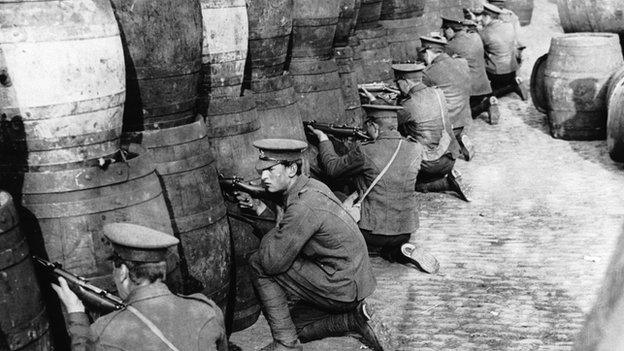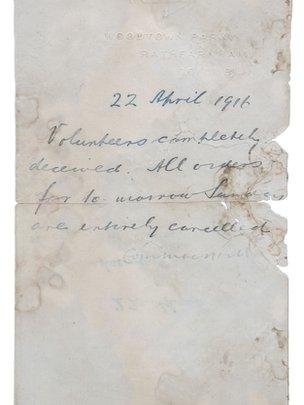Easter Rising: Eoin MacNeill's 'stop' order is sold for 30,000 euros
- Published

British forces in Dublin defeated the 1916 Easter Rising within days but the event is widely viewed as the catalyst for the later War of Independence and the creation of the Irish Free State
A 98-year-old document that was intended to stop a rebellion against British rule in Ireland has been sold at auction for 30,000 euros (£24,800).
It was handwritten by Eoin MacNeill, the commander of the Irish Volunteers, in a late-minute attempt to stop the 1916 Easter Rising.
The rebellion began on 24 April 1916 but ended after six days of fighting, and most of its leaders were executed.
The document was sold by Adam's Auctioneers in Dublin on Tuesday.
MacNeill's 11-word countermand is considered to be one of the most important documents in Irish history.
Confusion

The 11-word order was written by Irish Volunteers commander Eoin MacNeill
The handwritten order reads: "Volunteers completely deceived. All orders for tomorrow, Sunday, are completely cancelled."
The rebellion had been due to begin on Easter Sunday 1916, but MacNeill's order caused confusion among the rebel forces and their insurrection was delayed until the following day.
The brief, violent rebellion cost the lives of 450 people - more than half of whom were civilians - and resulted in widespread destruction of much of the Irish capital's inner city.
The Easter Rising was defeated by the British forces within days, but the execution of 15 rebel leaders who survived the fighting roused public sympathy for their cause.
The event is widely viewed as the catalyst for the Irish War of Independence two years later, which was followed by the partition of Ireland and the establishment of an Irish free state.
'Influential document'
MacNeill's handwritten countermand, the only known copy in private ownership, was put up for sale in Dublin, as the main attraction in a collection entitled 800 Years of Irish Political, Literary and Military History.
The order was expected to sell for between 30,000 euros (£24,800) and 50,000 euros (£41,000) and the sale was agreed at the lower estimate.
The identity of the new owner is not being made public, but the auction house confirmed the document was bought by a private collector who is based in Ireland.
Last month, Kieran O'Boyle from Adam's Auctioneers said the document had "changed the immediate course of Irish history to a significant degree".
He added that "with the exception of the Proclamation itself, it is probably the most important and influential document of the period of the rising".
The Irish Volunteers had been planning to hold peaceful manoeuvres on Easter Sunday 1916.
However, MacNeill found out that a group in the organisation, led by Padraig Pearse, had secret plans for an armed rising against the British.
When MacNeill tried to countermand this, the result was chaos and confusion, especially in areas remote from Dublin, where local commanders could not establish what was going on.
Consequently, there was no rising in Cork or Limerick.
The Irish government is planning a major commemoration of the Easter Rising to mark the centenary in 2016.